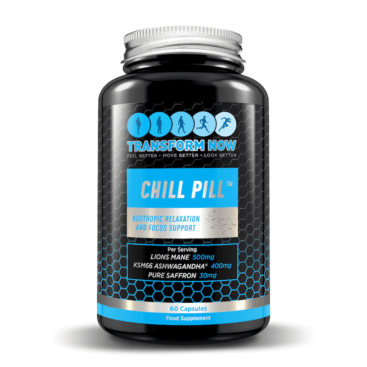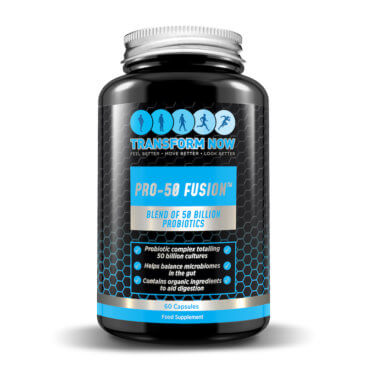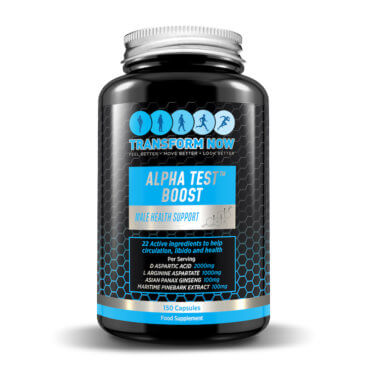What is testosterone?
Testosterone is the critical male sex hormone and is responsible for male sexuality. It’s the primary male hormone that produces the biological and psychological characteristics you’d associate with masculinity such as substantial muscle mass, strength, facial hair, libido, and sperm production. Additionally, the hormone has other vital functions such as helping with metabolism[1], cognitive processes[2], some sleep problems[3], preventing cardiovascular disease[4], low bone density[5] as well as several other important functions.

The basic chemical composition of testosterone is steroidal; and steroids are known to have significant physiological, as well as psychological, effects in males, especially adults. In some men, testosterone production reduces gradually from the age of 30[6]. Other studies suggest the average age when physiological levels drop is around 40[7], and the main symptom suffered by younger men, lack of energy and fatigue, are the first signs of low testosterone.[8]
So, as testosterone blood concentrations slowly decrease as men get older, they may experience a number of physiological and psychological events, such as a lack of sex drive, erectile dysfunction, acute depression, fatigue, low energy levels, and insomnia.
Increased testosterone levels have been shown to increase the growth of body muscles[9], which explains the popularity of anabolic steroids, and contribute to better activation of the nervous system, resulting in more power and strength, a better mood, enhanced libido, and many other benefits.
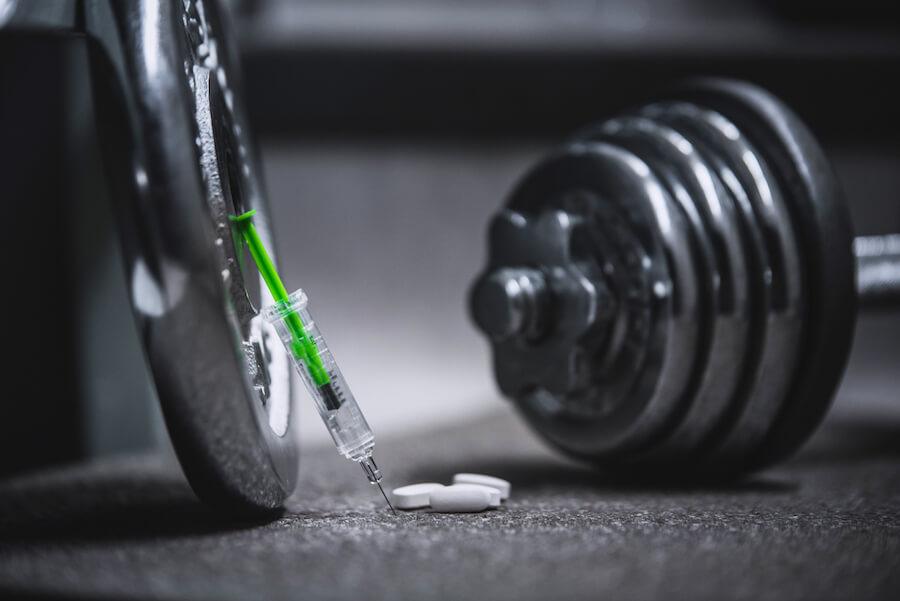
Previous research done on the anabolic role of testosterone and its impact on muscular strength in changes resulting from training has provided conflicting findings, and a positive correlation between testosterone-mediated responses and both functional performance and body composition was found.
What are normal testosterone levels?
This is a tough question to answer, and unfortunately, it doesn’t really have an answer in my opinion.
Normal values are considered to be the average levels of testosterone in studies across all-male populations found in studies of men ranging from the age of 20-80. This may seem ridiculous, but it’s very close to the truth. This will include men who are physically fit, men who are obese, men who exercise, men who take drugs or drink excessively as well as men who may be ill and be under physical, emotional or environmental stress.
To calculate normal testosterone levels, the top and bottom values are ignored, and the median average of normal levels is created – so you then have normal levels of testosterone. Or do you?
- According to the NHS [10], the figure is 10-30nmol/l.
- According to the British Society of Sexual Medicine[11], the values are:
- A Total Testosterone (TT) level lower than 8 nmol/l or Free Testosterone (FT) level lower than 180 pmol/l (<0.180 nmol/l; based on 2 separate levels from 8 to 11 AM) usually requires testosterone therapy.
- TT level higher than 12 nmol/l or FT level higher than 225 pmol/l (>0.225 nmol/l) does not require testosterone therapy.
- Levels from 8 to 12 nmol/l might require a trial of testosterone therapy for a minimum of 6 months based on symptoms.
It must also be noted that these are guidelines and up to the actual individual practitioner.
In recent years, Labcorp[12], one of the worlds leading diagnostic companies, changed its guidelines from 12-42 nmol/l (348-1197 ng/dL) to 9-32 nmol/l(264-916 ng/dl).
To further complicate matters different Endocrine bodies in Europe and the West have different opinions as to what are low or normal levels of testosterone. Doctors have widely different opinions on the importance of testosterone in older men or whether testosterone therapy is even useful.[13]
For the sake of argument, we’ll use 8.64 nmol/l to 32 nmol/l as the figures used by the NHS. So if testosterone levels are below 8.64 mmol/l a male patient is considered to have low testosterone and should be entitled to testosterone replacement therapy (TRT).
However, what happens when the patient has levels of 9.5 nmol/l and is feeling the traditional symptoms of testosterone deficiency. What does a doctor do? Usually, nothing. If they follow guidelines, they may issue antidepressants, or as one doctor said he would reassure the patient and send him home.
Factors that lower testosterone levels.
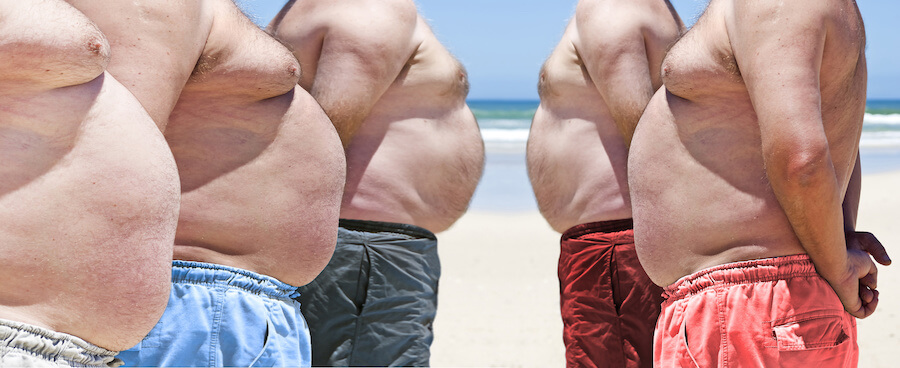
- Lack of sleep – many studies have shown that bad sleeping habits, as well as poor sleep, can not only reduce testosterone levels in both young and old men but also that bad sleep patterns or sleep disorders may be an indication of low testosterone (Wittert, 2014)
- Lack of exercise – inactivity and obesity are obvious factors [14]. [15]
- Obesity – countless studies have shown that obesity and obesity-related diseases reduce testosterone levels[16].
- Certain foods, especially soya-based foods – this has always been a controversial issue with some researchers claiming soya-based foods have no link to fertility and testosterone levels. However, an increasing body of research suggests the opposite. Certainly, anecdotal evidence would suggest soya decreases testosterone. Some studies such as Chavarro, Toth, Sadio and Hauser (2008) suggest that semen quality is reduced by the isoflavones in Soy food as well as a decrease in testosterone.
- Smoking – many studies have found smokers have lower levels of testosterone[17] and sperm counts. In contrast, other studies[18] have found no clear evidence. However, common sense would argue to reduce smoking or cut it altogether.
- Marijuana– countless studies have shown that Tetrahydrocannabinol (THC) and other chemicals affect testosterone production via the Leydig Cells[19] in the testis [20]. Other recent show the opposite – that marijuana may actually increase short term testosterone serum levels[21], but may reduce sperm levels[22].
- Alcohol – A direct link between alcohol and low testosterone was established many years ago with alcohol affecting testosterone levels by affecting the Leydig cells in testis.[23]
- A lack of vitamins and minerals – Vitamin E, Zinc, Selenium, Folic acid and B vitamins can reduce the level of testosterone as well as sperm quality. Recently, evidence shows that low levels of vitamin D3 can also reduce libido and testosterone levels.
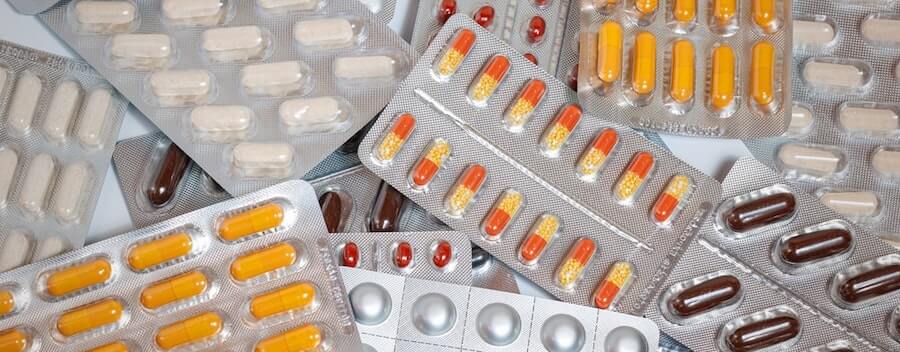
Prescription medications affect testosterone levels.
- Cimetidine (Tagamet) is often prescribed to people with ulcers or gastroesophageal reflux disease (GERD). It’s also available in an over-the-counter form to treat heartburn. It comes in tablet and liquid forms.
- Spironolactone (Aldactone) may be used with other medicines to treat high blood pressure and heart failure. It may also help people who have too much aldosterone, a hormone, or people who have oedema (fluid retention) from heart, liver, or kidney disease.
- Certain antidepressants may lower testosterone levels. A doctor can advise a patient on which antidepressant is most suitable.
- Chemotherapy drugs have been shown to lower testosterone levels, possibly because they can damage the testes – the organs that produce testosterone in men.
Recent studies have also shed some light on other drugs effects on testosterone:
- Opioids are pain relievers like morphine, codeine, hydrocodone (Vicodin), and oxycodone (OxyContin, Percocet).
- Anti-inflammatory medicine. Opioids are also classified as short-acting or long-acting. Short-acting opioids release medication quickly and are usually taken every four to six hours. In contrast, long-acting opioids release medication slowly and are generally taken every eight to twelve hours.
Signs, symptoms, and other physical or mental illnesses.
Testosterone Deficiency has well-established symptoms. The 4th International Consultation for Sexual Medicine (ICSM) made the following recommendations for the clinical diagnosis of TD based on the following signs and symptoms:
- Sexual dysfunction, especially low sexual desire, decreased morning and night-time erections, and Erectile Dysfunction (ED) are prominent, commonly presenting symptoms particularly suggestive of TD when associated with each other
- Less specific symptoms such as fatigue, sleep disturbance, loss of physical strength, decreased energy and motivation, and depressed mood is often present.
- Visceral obesity and decreases in muscle mass and bone mineral density are commonly observed.
- Hot flushes and changes in cognition and memory can be associated with TD.
- On physical examination, features suggestive of TD include decreased body hair, decreased testicular size, and gynecomastia, but these are not always present. Fine wrinkling of the skin, especially around the mouth, also can be apparent.
Clinical signs and symptoms suggestive of TD*.

Sexual:
- delayed puberty
- small testes
- infertility
- reduced sexual desire and activity
- reduced frequency of sexual thoughts
- erectile dysfunction
- delayed ejaculation
- reduced volume of ejaculate
- reduced or absent morning or night-time erections
Cardiometabolic:
- increased body-mass index (BMI) or obesity
- visceral obesity
- metabolic syndrome
- insulin resistance and type 2 diabetes mellitus (T2DM)
Physical:
- reduced body hair
- gynecomastia
- reduced muscle mass and strength
- hot flushes or sweats
- sleep disturbances
- fatigue
- osteoporosis, height loss, low trauma fractures
Psychological:
- changes in mood (e.g., anger, irritability, sadness, depression)
- reduced well-being or poor self-rated health
- reduced cognitive function (including impaired concentration, verbal memory, and spatial performance)
* TD is often associated with increased waist circumference, obesity, metabolic syndrome, and impaired health status. In a primary care population of men at least 45 years, the reported odds ratios for TD with comorbid conditions were:
- 2.38 for obesity
- 2.09 for T2DM
- 1.84 for hypertension
- 1.47 for dyslipidemia
- 1.40 for chronic obstructive pulmonary disease
- 1.20 for lower urinary tract symptoms related to benign prostatic hyperplasia.
Significant Testosterone Deficiency is associated with an increased risk of chronic anaemia and osteoporosis.
If you feel you may be affected contact your GP or learn more about service for low testosterone.
- https://joe.bioscientifica.com/view/journals/joe/217/3/R25.xml
- https://eje.bioscientifica.com/view/journals/eje/155/6/1550773.xml
- https://www.ncbi.nlm.nih.gov/pmc/articles/PMC3955336/
- https://www.ncbi.nlm.nih.gov/pmc/articles/PMC5512682/
- https://www.ncbi.nlm.nih.gov/pmc/articles/PMC5036835/
- https://www.ncbi.nlm.nih.gov/pmc/articles/PMC4816459/
- https://onlinelibrary.wiley.com/doi/full/10.1111/bju.12970
- https://onlinelibrary.wiley.com/doi/full/10.1111/bju.12970
- https://www.ncbi.nlm.nih.gov/pubmed/2917954
- https://www.southtees.nhs.uk/services/pathology/tests/testosterone/
- https://www.guidelines.co.uk/mens-health/bssm-guideline-on-adult-testosterone-deficiency/453888.article
- https://www.labcorp.com/assets/11476
- https://www.nhs.uk/conditions/male-menopause/
- https://www.ncbi.nlm.nih.gov/pmc/articles/PMC3040039/
- https://www.ncbi.nlm.nih.gov/pmc/articles/PMC3040039/
- https://www.ncbi.nlm.nih.gov/pmc/articles/PMC3955331/
- https://onlinelibrary.wiley.com/doi/pdf/10.1111/j.1365-2605.2006.00720.x
- https://www.sciencedirect.com/science/article/pii/S1743609515325595
- https://www.mdmag.com/medical-news/is-there-a-link-between-low-testosterone-and-chronic-marijuana-useandrwe
- https://www.ncbi.nlm.nih.gov/pubmed/6090909
- https://www.ncbi.nlm.nih.gov/pmc/articles/PMC5660879/
- https://academic.oup.com/aje/article/182/6/473/82600
- https://www.ncbi.nlm.nih.gov/pubmed/11910706


